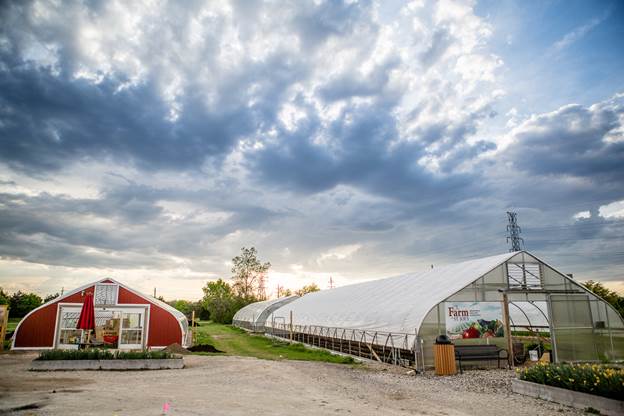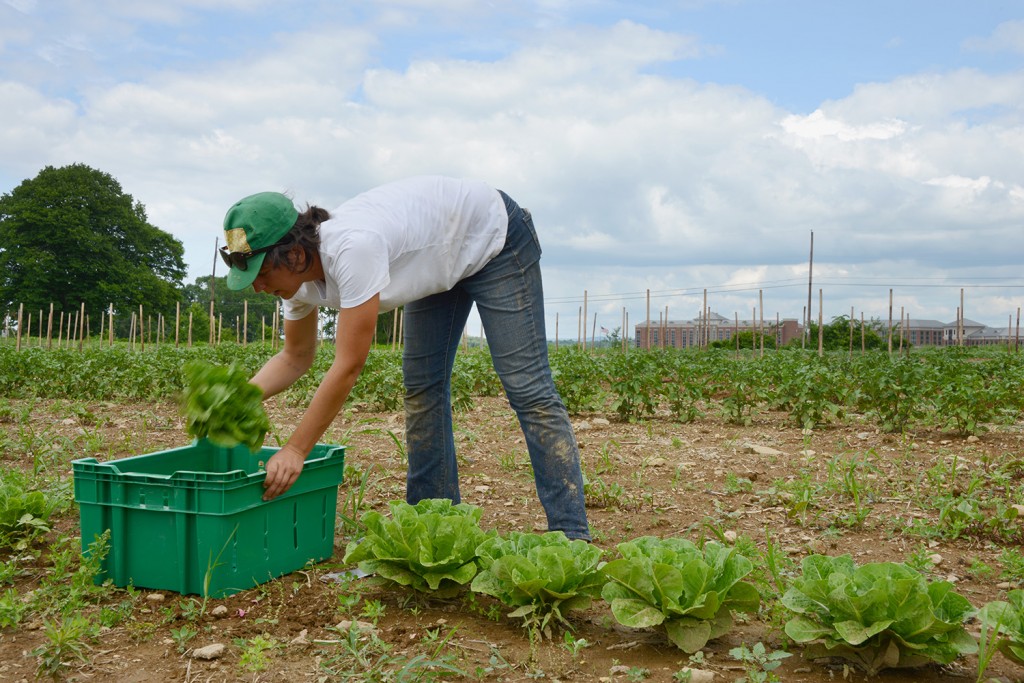Post/content/images are from CivilEats.com – and – anderson.slhn.org
Are Hospital Farms the Next Big Thing in Healthcare Reform?
When it comes to improving the food on today’s hospital trays, some medical institutions are finding that onsite farms are the next logical step. By Jodi Helmer on July 21, 2015

St. Luke’s Rodale Institute Organic Farm
This summer, St. Luke’s Hospital started sending all new moms home from the hospital with a basket of fresh produce, recipes and literature about the importance of a healthy diet.
All of the produce in the basket was grown on an organic farm on the hospital’s Anderson campus in Bethlehem, Pennsylvania. The hospital—part of a six-campus network—has been running a farm on the 500-acre grounds since 2014.
“Our mission is to provide great healthcare and part of that is educating patients about the benefits of a plant-based, organic diet,” explains Ed Nawrocki, president of the Anderson campus. “One of the best ways to do that is to lead by example and show them how delicious produce grown on our farm tastes.

Produce from the farm will be utilized in our network cafeterias and served to patients, employees, and visitors.
But it’s not just new moms who benefit from the hospital’s bounty. In its first season, the farm at St. Luke’s grew 12 varieties of vegetables on five acres, producing 44,000 pounds of produce that was served to patients, incorporated into the cafeteria menu, and sold at weekly farmers markets on several hospital campuses. This year, the farm expanded to 10 acres and 30 varieties of fruits and vegetables.
Mark “Coach” Smallwood, executive director at the Rodale Institute, the nonprofit organization that worked with St. Luke’s to help get its farm off the ground, believes there is a growing interest in serving organic, locally grown produce at hospitals.
Some, like the University of Wisconsin Hospital, buy produce from local farms, others allow the community to use land on their campuses for community gardens. Now, a few hospitals are taking the next step, starting farms on hospital campuses. Among them are Stony Brook University Hospital on Long Island and Watertown Regional Medical Center in Wisconsin. Both are now using produce grown onsite to replace fruits and vegetables that are packaged and shipped thousands of miles before reaching patients.
“Hippocrates talked about food as medicine and we believe that to be true,” Smallwood says. “There is a paradigm shift happening and hospitals are realizing the value of producing fresh, local, organic food to serve to their patients.”

St. Joseph Mercy Ann Arbor Hospital in Ypsilanti, Michigan, planted the first crops on a 10-acre onsite farm in 2010 after patient satisfaction surveys revealed a demand. Over the past five years, the farm has grown to 25 acres, three hoop houses and four beehives. The farm grows fresh spinach, garlic, basil, collard greens and strawberries.
“The farm helps us support a culture of wellness in the hospital,” says director of nutrition and wellness Lisa McDowell. “We can’t grow enough to meet the needs of all of our patients and staff, but we can make an educational statement about the importance of eating a healthy diet.”
While farm-to-hospital efforts have been well received by patients and created PR opportunities, operating a hospital-run farm is not without its challenges.
For starters, administrators are experts in healthcare, not agriculture.
To help launch its farm, St. Luke’s partnered with the Rodale Institute for assistance in creating and implementing a plan, hiring a farmer, and managing operations. At St. Joseph Mercy, the hospital invested $32,000 in two hoop houses, hired a full-time farmer to manage farming operations for the 537-bed hospital and relies on interns and volunteers to handle most of the labor.

As an employee of the Rodale Institute, Lynn Trizna, an organic vegetable farmer, is excited to work with St. Luke’s on developing the St. Luke’s Rodale Institute Organic Farm. Farmer Lynn’s passion for organic agriculture began the summer of 2007, when she spent the summer working on her first farm.
It took a $125,000 capital investment to start the farm at St. Luke’s and, after two growing seasons, the farm is operating at a loss (with a goal of breaking even in 2016). The reason: Growing organic produce on the farm is more expensive than purchasing it through a foodservice supplier or sourcing it from local farms. But Nawrocki still champions the idea, explaining that encouraging patients to eat healthier diets now could improve their health in the future.
In addition to the capital investment to start farms, hospitals that want to serve fresh produce must invest in recipe development and training foodservice workers to transition from heating and reheating prepared foods to making dishes from scratch.
“When we order produce from a food service provider, it comes peeled and chopped and portioned; all our staff has to do is open the package and add it to the recipe,” McDowell explains. “Cooking with fresh foods from our farm is much more labor intense.”
In the future, the hospital hopes to partner with a local culinary program, using interns to offset the additional labor costs and make its hospital farm cost neutral by 2020.
Read more here: http://civileats.com/2015/07/21/are-hospital-farms-the-next-big-thing-in-healthcare-reform/
For more information about St. Luke’s Rodale Institute Organic Farm please visit their page here: http://anderson.slhn.org/About/Organic-Farm





















What a great idea. Hospital food always struck me as part of the problem. Now if we could also get those moms planting their own gardens when they get home, too. Maybe throw in a couple of seed packages!
Absolutely! 🙂